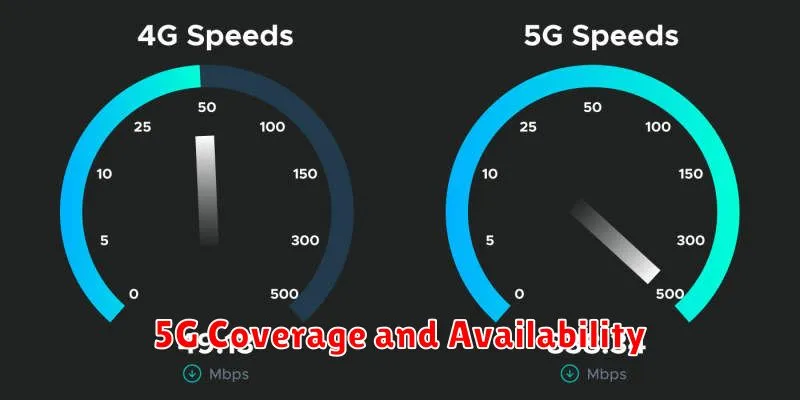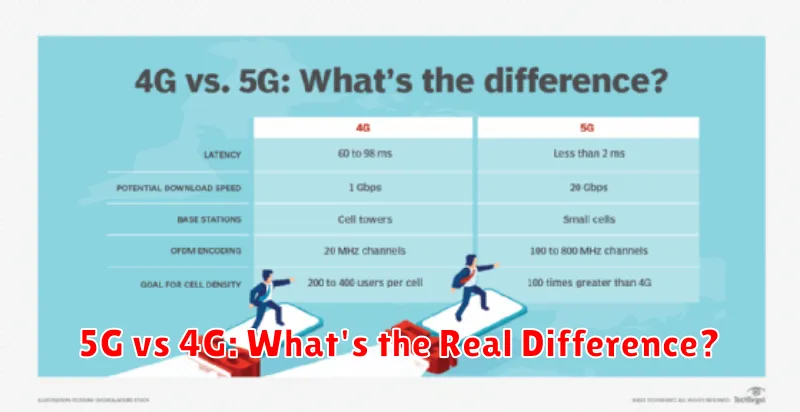In the rapidly evolving world of mobile technology, the transition from 4G to 5G represents a significant leap forward. This article delves into the core distinctions between 5G vs 4G, exploring the advancements and practical implications for users. Understanding the real difference between these two generations of wireless technology is crucial for making informed decisions about devices and data plans. We’ll dissect the key performance indicators, such as speed, latency, and bandwidth, to highlight the advantages 5G offers over its predecessor, 4G. From enhanced mobile broadband experiences to the potential to revolutionize industries, this comparison will clarify the transformative power of 5G.
Beyond just faster download speeds, the difference between 5G and 4G extends to a fundamental shift in network architecture. We will examine how 5G‘s innovative technologies, like millimeter wave and beamforming, contribute to its superior performance. By comparing 5G vs 4G across various use cases, including streaming, gaming, and the Internet of Things (IoT), we’ll illustrate the tangible benefits of upgrading. This exploration of 5G vs 4G will empower you to navigate the complexities of the next generation of wireless communication and understand the real difference this technology brings to the table.
Speed Comparison in Real Usage
While theoretical speeds are impressive, real-world performance can vary. 5G aims to deliver peak data rates of up to 20 Gbps, but users typically experience speeds ranging from 100 Mbps to 1 Gbps. This is still significantly faster than 4G, which averages between 10 Mbps and 50 Mbps in real-world usage.
Several factors influence these speeds, including network congestion, signal strength, and device capabilities. In areas with robust 5G infrastructure, users will likely observe a substantial speed increase compared to 4G. However, in areas with limited 5G availability or during periods of high network traffic, the difference might be less pronounced.
Latency and Reliability Differences
A key differentiator between 5G and 4G lies in latency and reliability. Latency refers to the delay before a transfer of data begins following an instruction for its transfer. 5G boasts significantly lower latency compared to 4G, potentially as low as 1 millisecond. This near real-time responsiveness opens doors for time-sensitive applications.
Reliability, the consistency of a network connection, also sees improvement with 5G. 5G offers a more stable and robust connection, less susceptible to interference and dropouts. This enhanced reliability is crucial for applications requiring uninterrupted data flow, such as remote surgery or autonomous vehicle control.
Battery Impact on Devices
One common concern about 5G is its impact on device battery life. While 5G can offer significantly faster speeds, it can also consume more power than 4G. This is because 5G requires more processing power to handle the complex signals and higher data rates.
The actual battery drain depends on various factors such as signal strength, network congestion, and the device’s power management capabilities. Generally, 5G usage will result in a noticeable decrease in battery life compared to 4G. However, advancements in battery technology and power optimization are continuously improving, mitigating this impact.
5G Coverage and Availability

While 5G promises significantly faster speeds and lower latency than 4G, its availability is still a key consideration. Deployment of 5G networks is an ongoing process, and coverage can vary considerably depending on your location and carrier. In many areas, 5G coverage is primarily concentrated in densely populated urban centers, while rural areas may still rely heavily on 4G or even older technologies.
It’s important to check with your mobile carrier for specific 5G coverage maps in your region. Even within areas advertised as having 5G, the actual signal strength and performance can fluctuate due to factors like building density and local infrastructure. Therefore, it’s crucial to understand the real-world availability in your specific location before committing to a 5G plan or device.
Is Upgrading to 5G Worth It?
The decision to upgrade to 5G depends on several factors. Do you live in an area with reliable 5G coverage? Are you experiencing limitations with your current 4G speeds? Are you willing to potentially pay more for a 5G plan and a 5G-compatible device?
If you’re content with your 4G experience, upgrading may not be necessary right now. However, if speed and low latency are crucial for activities like gaming, video streaming, or working with large files, then 5G might be a worthwhile investment. Coverage is consistently expanding, making 5G increasingly accessible.
Ultimately, weighing the costs and benefits based on your individual needs and the 5G availability in your location will determine if upgrading is the right choice for you.

